Research infrastructure
Research infrastructure
Research Services
UMO offers its researchers a wide selection of support services, from the application process, planning and conducting (clinical) studies to the provision of (research) data and research data management.
Coordination Centre for Clinical Studies (KKS)
The Coordination Centre for Clinical Studies (KKS) Oldenburg is a service centre of the University of Oldenburg, located at the office of the School V - School of Medicine and Health Sciences.
The KKS aims to support science-initiated clinical questions and multidisciplinary research in the field of clinical studies. This includes support in the planning and conceptual development of projects as well as professional support for studies during the application and acquisition of third-party funding.
Contact person
Medical Ethics Committee
The medical ethics committee reviews and evaluates medical research projects, clinical trials, treatment protocols and other medical practices to ensure that they comply with ethical and legal guidelines. In particular, it checks whether the risks are appropriately weighed up, whether the information and consent criteria are met and whether the research or treatment complies with the principles of medical ethics.
In addition, the UMO Medical Ethics Committee serves as an advisory centre for researchers, doctors, medical staff and institutions on ethical issues in the medical field.
Contact persons
Oldenburg MeDIC
The "Oldenburg MeDIC" project, modelled on the Medical Informatics Initiative, is intended to support local research in Oldenburg. A joint medical data integration centre (MeDIC) is to be set up for the University of Oldenburg with local components in the four participating hospitals. The main objective of this project is to support clinical research and care in Oldenburg based on simplifying access to routine medical data.
Contact persons
Biometric counselling
For biometric advice and consulting, researchers can contact the Biometry Service Office. It works closely with the KKS of School VI.
Contact persons
Research Data Management (RDM)
Evidence-based medical research is subject to specific requirements, particularly in the areas of ethics and data protection (special categories of personal data). In this context, the Research Data Management Service offers tailored consulting and support services for members of Faculty VI. The focus is also on the reusability of data (FAIR data) and the reproducibility of research results.
In addition to general consulting regarding the design of data management processes, IT services are provided with an emphasis on the data collection and curation phase. These include tools for digital data collection, online surveys, and laboratory management.
Contact person
Biomedicum
Biomedical research increasingly requires state-of-the-art research infrastructure and expertise in various disciplines. The Core Facilities at UMO and the University of Oldenburg provide scientists at the School of Medicine and Health Sciences with rapid access to existing research infrastructure and expertise.
Biobank
The Core Facility (CF) Biobank structure is an infrastructure for researchers. It provides hardware and software solutions and advises researchers on biobank-related topics. The goal is to support research projects involving the University Medicine Oldenburg (UMO).
Contact person:
Microscopy
Fluorescence Microscopy Service Unit
The Fluorescence Microscopy Core Facility provides several high-resolution confocal laser scanning microscopes. All systems contain several lasers with different excitation wavelengths so that stained tissue or cell cultures can be imaged under the microscope accordingly. With the help of a deconvolution workstation (Huygens), the microscopic images or image stacks can be further improved in their depth of field and displayed in higher resolution.
A Zeiss Axio Scan Z1 slide scanner (high throughput screening), a Leica TCS SP5 II microscope (confocal microscope with additional super-resolution STED module), a Leica TCS SP8 microscope (confocal microscope) and an Olympus FV3000 (confocal microscope) with an incubator for LiveCellImaging and an additional upgrade from Picoquant for measuring local fluorescence lifetimes and detecting protein-protein interactions.
Contact persons
Scientific board
Electron and light microscopy service unit
The electron microscopy service centre operates two transmission electron microscopes (Zeiss EM902A, Jeol2100F) and a scanning electron microscope (JEOL IT 800).
Furthermore, a coating device (C, Au, Pt), a critical point drying system and two ultramicrotomes are available for sample preparation.
Contact person:
Neuroimaging Unit
The Neuroimaging Unit operates two large devices: a 3-Tesla magnetic resonance imaging (MRI) scanner and a magnetoencephalography (MEG) device. Both devices were acquired exclusively for research purposes. Equipped with different systems for auditory and visual stimulation, an MRI-compatible EEG system, response boxes, and a data glove for motion capture, both sensory, functional, and cognitive functions of the brain can be recorded and analyzed.
Contact Person
Proteomics platform
The proteomics platform is available within the framework of collaborations.
Contact person:
Radiation protection and isotope laboratory
At the University of Oldenburg, the handling of open radioactive sources is only permitted within the rooms of the isotope laboratory of School VI. They can therefore be used by all members of the university. Several laboratories are available for nuclide-specific work. All laboratories are equipped in accordance with the provisions of the Radiation Protection Ordinance and also contain standard equipment for biochemical, molecular biological and production biology work. In total, handling licences for 64 different nuclides are currently available. The isotope laboratory is designed as a control area. The service for users includes advice on measurement and safety technology, monitoring of personal and environmental contamination, as well as the regulated disposal of waste.
Contact person:
Animal research
If you have any questions regarding animal research, please contact the University's Animal Welfare Officer:
Scientific computing
The high-performance computer (HPC cluster) ROSA provides all research groups at the university with the opportunity to carry out compute-intensive research tasks. The cluster consists of approximately 90 compute nodes with over 11,000 computing cores and a theoretical CPU computing power of 625 TFlop/s, as well as a theoretical GPU computing power of 1,608 TFlop/s. The compute nodes are configured differently (CPU, RAM, local I/O, GPUs) to cover a wide range of requirements. The HPC cluster can be utilized for both serial and parallel applications. Various data storage systems with a total capacity of several petabytes are also available as part of the HPC system or as a service provided by the IT services.
Contact person:











